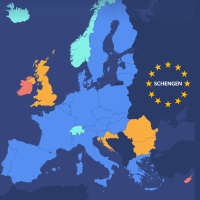
Part one: Statutory portion
The below part is based on inheritance and succession law in Cyprus and discusses the difference between the statutory portion and the disposable portion of an estate.
Any person, provided that certain conditions are met, can draft a will, namely a written statement expressing their intentions regarding how their assets and estate are to be disposed after their death.
In Cyprus, the part of the estate that can be disposed of through a will is subject to restrictions.
For this reason, inheritance is divided into a statutory and a disposable portion:
- The statutory portion is the part of the estate that cannot be disposed of through a will;
- The disposable portion is the part of the estate that can be disposed freely through a will without restrictions.
In case there are surviving relatives, the estate cannot be disposed by will in its totality. The Wills and Succession Law (Cap. 195) provides for a statutory portion that will have to be passed according to forced heirship rules.
The exact proportion between the statutory and the disposable portion depends on the surviving relatives or inheritors, and the portions are calculated after the repayment of any debts or liabilities the estate may have.
The following examples serve to illustrate the above:
- If the testator has a surviving spouse and children, the statutory portion is fixed at three-fourths, and only a quarter of the estate can be disposed of through the will;
- If the testator has a surviving spouse or a parent, but no children, then the statutory portion is fixed at half of the estate, while the other half can be distributed through the will;
- If at the time of death, the testator has no children, no descendants of children, and no surviving spouse or parent, the totality of the estate may be disposed of according to the will.
Part two: What makes a person unworthy of succession?
According to the Cypriot Law on Wills and on Succession (Cap. 195), a person is deemed unworthy to inherit, if they:
- have been convicted of intentionally and unlawfully causing the death (or of intentionally and unlawfully attempting to cause the death) of the person whose estate is the object of succession;
- have been convicted of the murder or of the attempted murder of the child, parent, husband or wife of the person whose estate is the object of succession;
- by coercion, fraud or mental pressure have caused the testator to make a will or revoke an existing will;
- have obstructed the testator from making a will or altering or revoking an existing will;
- have submitted to a supposititious will to the testator;
- have illegally altered or destroyed the testator’s existing will; or
- have aided or encouraged any person to commit any of the above acts.
Part three: What share are relatives entitled to?
According to the provisions of the Law on Wills and on Succession (Cap 195, section 44), a person becomes an inheritor if they have a kinship relationship up to the sixth degree with the decedent.
Cypriot legislation provides for four classes of kinship. Members of a class exclude the members of the following class.
After the repayment of any debts or liabilities, the spouse is entitled to a share in the statutory portion – namely, the part of the estate that cannot be disposed by a will and the part of the disposable portion that remains undisposed, if any. The remaining part of the statutory portion and of the disposable portion that remains undisposed, if any, will be distributed to the relatives of the deceased according to the degree of kinship.
The following table contains further details on the class, the types of relatives and descendants, and the shares they receive.
| Class | Types of relatives and descendants | Shares received |
| First class | Option A – Living spouse and children of the deceased. | In equal shares. |
| Option B – Living descendants (of any of the natural children of the deceased) that had passed away during the lifetime of the deceased person. | In equal shares by branch. | |
| Second class | Option A – Living mother and father of the deceased (or if they are not alive at the time of death of the deceased, the closest living ascendant) and the siblings or half-siblings of the deceased. | In equal shares, with the exception of half siblings, who receive half of the share to which siblings are entitled. |
| Option B – Living descendants of any of the deceased’s siblings that passed away during the decedent’s lifetime. | In equal shares by branch. | |
| Third class | The closest (in degree of kinship) living ascendants of the deceased. | If, at the time of death of the deceased, there are living ascendants on both sides (namely on the maternal and the paternal side of the family tree), the ascendant of each side will receive half of the share. If there is more than one ascendant on each side, each half will be distributed in equal shares. |
| Fourth class | The closest (in degree of kinship) living ascendants up to the sixth degree of kinship. However, the closest relative excludes others. | In equal shares. |
The information provided by A.G. Paphitis & Co. LLC is for general informational purposes only and should not be construed as professional or formal legal advice. You should not act or refrain from acting based on any information provided above without obtaining legal or other professional advice.
For further information please contact us.














